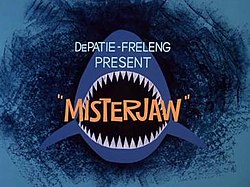Plot
Misterjaw (voiced by Arte Johnson) was a blue-colored great white shark (who wore a purple vest with white collar, a black bow tie and black top hat) who liked to leap out of the water and shout "HEEGotcha!" or "Gotcha!" at unsuspecting folks who would run off in terror. He spoke with a German accent and was known to mispronounce words, such as "knucklehead" pronounced as "ka-nucklehead". He also had a sidekick, a green-scaled, brown bowler hatted Brooklyn-accented catfish named Catfish (voiced by Arnold Stang) who usually referred to Misterjaw as "Boss" or "Chief"; Misterjaw usually called Catfish either "pal-ly", "fella" or "sonny" when in a good mood, or names like "dumbkoff", "ka-nucklehead" or "macaroni brain" when irritated. [2] At times, Misterjaw would mistakenly address his sidekick as "Dogfish", only to correct himself a split second later by saying "I mean, Catfish".
The primary goal of Misterjaw and Catfish was to catch Harry Halibut (voiced by Bob Ogle). In several instances, the duo were pursued by Fearless Freddy the Shark Hunter (voiced by Paul Winchell) in "Merry Sharkman, Merry Sharkman" and "To Catch a Halibut".
All entries were directed by Robert McKimson (who died suddenly after production was completed) with co-direction from Sid Marcus and produced by David H. DePatie and Friz Freleng. The music and score for the series were composed by Doug Goodwin. A brief version of the John Williams Jaws theme was used with the variation of the two-note theme. None of the shorts contained any credit information; only the series title, episode title, 1976 copyright and end titles were shown. All episodes include a laugh track.
This page is based on this
Wikipedia article Text is available under the
CC BY-SA 4.0 license; additional terms may apply.
Images, videos and audio are available under their respective licenses.

